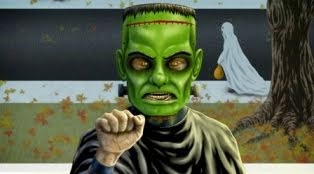5. Elvis
In a deleted scene in “Pulp Fiction,” Quentin Tarantino via Mia Wallace says you’re either a Beatles man or an Elvis man. Up until recently, I could say I was a die hard Beatles man. However, I’ve recently come to reassess the music of the King and found myself liking a lot of it. You can't deny the guy's overwhelming influence on rock music and culture. Decades after his death, people are still obsessed with him, creating museums and extensive personal collections. Considering the huge shadow his life and career cast over American pop culture, it's sort of surprising John Carpenter's "Elvis" is only one of a few biographical films about the guy.
John Carpenter got the job of directing “Elvis” supposedly because the producer, knowing he scored his own films, figured Carpenter knew music so he must’ve known a lot about Elvis. Whither or not that’s true or makes any sense doesn’t matter. “Elvis,” a work-for-hire TV movie, is important to the Carpenter filmography for a simple reason. It was the first time the director was paired with Kurt Russell, who would go on to become not only a good friend but the director’s favorite leading man.
What’s most interesting about the film is that it doesn’t really focus on Elvis: The Phenomena. For a fact, his ascent through the pop culture mindset doesn’t really register. Instead, the movie is a personal take on the King. His relationship with his mother in the first half is very important and his romance with Pricilla dominates the second half. He talks with his dead twin brother in several scenes. The movie is attempting to capture Elvis: The Man, not Elvis: The Most Defining Face in American Pop Music and Popular Culture. The first hour is squarely devoted to the man's humble root. It shows his debt to his family and country boy beginnings. A notable moment involves a pick-up truck race. The movie is successful in getting you to relate to a frequently far-out figure.
This, naturally, makes the movie a showcase for its lead performance. Russell is dead-on in the part. He looks a lot like Elvis and perfectly imitates the King’s mannerism without going overboard into parody. This relatable performance and a story focused on personal aspects go a long way towards humanizing an iconic figure, which was obviously the intention. The movie is also very well paced and breezes by despite nearly being three hours. It's separate clearly into three chapters and, despite "the rise again" part of the "rise-fall-rise again" cycle never being in doubt, you still care.
This is such a showcase for Kurt that the supporting cast is easily overlooked. Shelly Winters is good as Elvis’ mom, hiding a lot of insecurities under a calm demeanor. A moment of her sitting in the newly minted Graceland, conflicted about her son's rock royalty, stands out. Always underrated character actor Pat Hingle needed more to do as Col. Parker and is mostly confined to a handful of small scenes. The movie doesn’t touch on the Colonel’s corruption at all, probably the most interesting, memorable thing about him. Season Hubley, who Russell was dating at the time, underperforms as Priscilla. You don’t really understand while Elvis falls so deeply in love with her so quickly. Hubley is flat and rather unemotional. There's certainly no evidence to suggest such devotion and passion in their relationship.
As I mentioned early, the movie is so focused on Presley’s personal life that not much time is spent on his status as a pop culture phenomena and icon. He goes almost immediately from playing county fairs to earning gold records and buying Graceland. There are several musical numbers, obviously, and while they showcase Presley’s music, they don’t move the film along. (I assume Russell was dubbed but, if he did indeed do his own singing that makes his performance even more impressive.) Sadly, the movie cuts off before the King’s plummet into pills and obesity in the seventies. I guess dying bloated on his commode would’ve made for a pretty down beat ending, but it feels like an essential part of the story is left out. “Elvis” is a pretty basic musician bio-pic. It’s not much of a Carpenter film, save for a few POV tracking shots. Another rarity for many years, the movie is now widely available to be treasured by Elvis devotees and regarded by Carpenter fans as an oddity, notable mostly for an excellent lead performance. [Grade: B]
Subscribe to:
Post Comments (Atom)





No comments:
Post a Comment